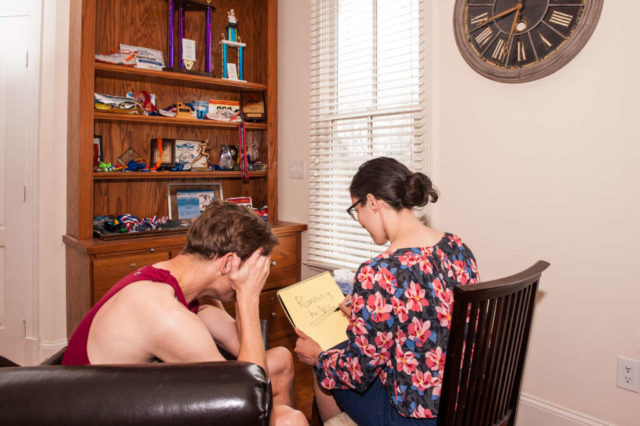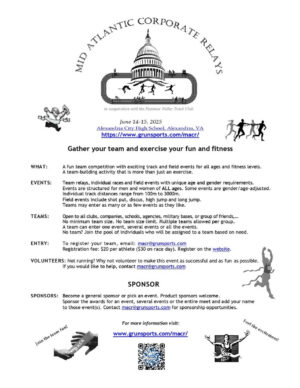
The Washington D.C. metropolitan region ranks near the top of most lists of things that cause stress — from traffic to cost of living, poverty, work demands and more. And since November, tensions have seemed to run higher than usual in the city, with the fate of federal jobs seemingly hanging in the balance. But you don’t have to buy a coloring book or move to Canada to feel better. Whatever your worries, locals in the know agree that running is a vital tool to care for yourself in stressful times.
Just ask Dr. Keith Kaufman, a runner and a clinical psychologist specializing in sport and exercise psychology. At his Northern Virginia practice, he works with high-performing athletes and beginners trying to develop exercise routines. He’s seen it all — student athletes pushing themselves to the breaking point, elites trying to achieve new heights in performance and of course the stereotypical Type-A D.C. professional whose day is scheduled down to the minute. A self-described Type A himself, Kaufman is an evangelist for running to manage stress or anxiety.
Stress, put simply, is the body’s physical response to perceived danger. It’s our fight or flight instinct transposed onto modern society, where we worry more about money, jobs or relationships than, say, being attacked by a bear. Anxiety is the emotional response, the dread or discomfort from those unresolved threats. Both tax the body and mind and can, if left unmanaged, lead to exhaustion, a weakened immune system, poor sleep and eating, and other symptoms that look a lot like depression.
“It’s almost like you’re driving your car with your foot slammed down on the gas,” Kaufman says of stress. “Eventually, something’s going to break down if you drive that way.” The key to fighting stress is to replenish energy, not through idle stimulation like television or social media, but through release and reward, he said.
“I feel best when I’m in motion,” said Amy, of Alexandria, a runner who has long been prone to anxiety and uses running and training to release that tension. Of the sources of her stress, she said, “I feel like in some ways, I always operate at just a heightened level…. I really struggle to turn my head off. It’s not one thing that keeps me up at night.”
Stress makes her feel wound up and she sometimes grinds her teeth. In the worst moments, it robs her of sleep. Laying awake at night, she would worry about not sleeping, or the work awaiting her the next day that she would be too tired to complete, and the night would become a self-fulfilling cycle of stress. And when her dad passed away a few years ago, her anxiety and depression spiked.
Over the years, Amy tried a variety of fixes to manage her anxiety with limited success. She ramped up her training beyond its usefulness, leading to injury and adrenal problems. She fixated on healthy eating until eating made her anxious. Over time these fixes became stressors themselves, rather than the relief she’d hoped for.
“If somebody is doing too much of a good thing and it’s starting to take on a life of its own or interfering with life functioning or somebody is getting a little too fixated on it,” the exercise becomes counterproductive, Kaufman said. He emphasizes flexibility to minimize reliance on one source of stress relief.
Eventually, Amy worked with her doctor to build a holistic plan to manage her anxiety and depression. She uses breathing exercises and meditation to calm her thoughts so she does not rely solely on exercise. She also takes antianxiety and antidepressant medications, in addition to supplements. “I don’t think medication solves problems,” she said. “I think medication just adjusts your threshold a little bit so that you have the ability to actually deal with things yourself.” She feels that the medication gives her the space to manage her own stress and anxiety without becoming overwhelmed, something she had been struggling with.
With time, patience and this multi-pronged approach, she has regained the health benefits of running. Physically, she is stronger and less injury-prone. Mentally, she once again feels enjoyment, relief and a sense of control when she runs.
“I have the same reaction on a beautiful 55-degree day that’s sunny, no wind, sort of that perfect running condition as I do on a day where it’s terrible out, pouring or really windy or whatever. It almost doesn’t matter,” she said. “I just really like being outside and I like the act of the run and moving from point A to point B. Ninety-nine-point-nine percent of the time, if I’m having a bad day or stressed, if I go out and just do something, it’s a night-and-day difference.”
Running is a popular way to relieve stress because it’s readily available with relatively little fanfare. “All you basically need is some decent clothes and shoes and you can go out and run and it’s such great exercise, such a wonderful way to release,” Kaufman said. Endorphins make you feel better and the exercise shakes up tense muscles. The physical exertion distracts your racing mind and afterwards, your concerns seem to weigh less on you. That release repays the debts we accumulate in stressful times, when we ask more of our bodies than they can comfortably provide.
A few miles away in D.C., Jamie Hospers runs for the reward. As his first year at top-tier Georgetown Law School winds down, Hospers is worried about finding a legal internship for the summer. He is worn down from studying and attending classes for 50-60 hours per week, many more than he used to work as a paralegal in Rochester, N.Y. He dwells on the debt he has taken on to enroll in the program. He frequently worries that he might not get everything done, that he might not be good enough. And now that he’s left his hometown, he doesn’t have much time to keep up with the supportive family he used to live near. So he runs between classes. This means he usually runs alone, but he likes the break.
“I use it as a way to reset my day,” he said. “I’ve been thinking about nothing but the law or jobs, the two things that are the sources of stress in my life, for the entire day up until the run. On the run, I try to not think about anything, which I’m usually successful doing.”
Afterwards, Hospers said, “I feel accomplished. I have a feeling of satisfaction that I just did something that not everyone finds time to do. That’s a confidence booster.” This clarity and confidence prepare him for an afternoon in class or the library.
Such a feeling of satisfaction relates to self-efficacy, or the basic belief that we can do something. It’s one of the most important things a restorative activity like running can provide when we’re otherwise feeling overwhelmed or anxious.
“The more self-efficacy we have, that can be very protective against stress, right?” Kaufman said. “So maybe work is going poorly right now, but my gosh, I just, for the first time in my life, ran three miles and I can’t believe I did that. So building that sense of accomplishment and self-efficacy can be really powerful.”
Besides release and reward, routine is the third ‘r’ in managing stress. Kaufman recommends some amount of stress relieving activity every day for maximum benefit, but it doesn’t have to be running.
“Life happens,” he notes. Sometimes you get sick, or work late, or forget your shorts at home. So be flexible and forgiving when you need to. If you don’t feel like running, swim, do yoga, or spend a quiet night in. This variety can also help you avoid injury, which causes its own stress.
If your motivation is lagging, research suggests that joining a group helps participants stick with an endeavor like running. Groups provide accountability, structure, support, and a social outlet that can take your mind off nagging problems. With dozens of local groups for every speed, distance and personality, local runners can find their niche from run-walking to elite competition. And increasingly, virtual communities allow runners from far-flung corners of the globe to share advice and encouragement.
Amy has been a member of a local running team since 2011, and she has trained remotely with another coach since 2015. Both have offered friendship, structure and accountability, she said, and the Facebook activity of her virtual team is a welcome reprieve from worrisome news and stressful political posts. For his part, Hospers looks forward to Friday night runs with the Argonaut Running Club, since his midday workouts often leave him running solo.
Another reason running works as a stress reliever? You change venues. If you’ve been sitting at a desk all day, moving outside or to a treadmill can pull your mind away from the things it’s been dwelling on. Amy and Hospers both like to get off the city blocks to clear their minds. Hospers heads to the Rock Creek Park trails along the Potomac River and Amy can access the Metropolitan Branch Trail from her office.
The city blocks can be stressful, but “Once I’m on the river, there’s no interruptions,” Hospers said. “There’s a lot of space. That’s definitely my favorite spot. I can open up and breathe a little bit.”
Finally, if running starts to feel like an obligation, Kaufman recommends taking a cue from yoga class. Setting an intention can help you reframe the effort as a reward, not a requirement.
“If you’re going to wake up at 5:30 in the morning to go for a run, [remember] to take a pause maybe while you’re putting your shoes on or while you’re getting ready to go outside or go on the treadmill,” he said.
Ask yourself, “Why am I doing this? Am I doing this because I have to? Am I mindlessly following a checklist of things for my day? Or am I doing this because I know it helps me feel better because it’s what I want to do and I love this feeling and am proud of myself for getting up and making this effort?”
Whatever is at the root of your stress or anxiety these days, take comfort in knowing you’re not alone and you’re not powerless. Resist the urge to curl up in a ball on a tough day. When you need it most, lace up those sneakers and go. You’ll be glad you did.
The article initially appeared in the Summer 2017 issue of RunWashington.
Recent Stories
Looking for our race calendar? Click here Submit races here or shop local for running gear
Hero Dogs 5K9
Hero Dogs Inc will host its 5th Annual 5K9 race at the Congressional Cemetery on Saturday, May 17th, beginning at 8 am. There will also be a 1K Fun Run. The 1K Fun Run will start at 8 am sharp
Mid Atlantic Corporate Relays
Team relays, individual races and field events with unique age and gender requirements. Events are structured for men and women of all ages.
Some events are gender/age graded. Individual track distances range from 100m to 3000m.
Field events include shot






